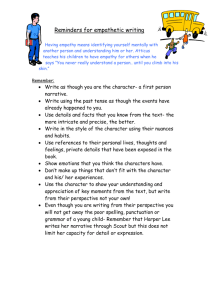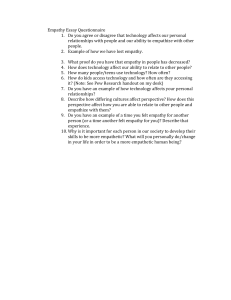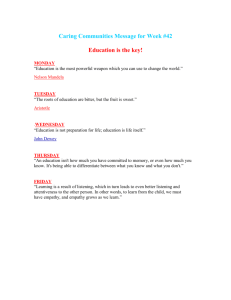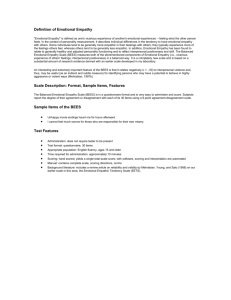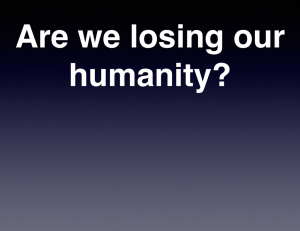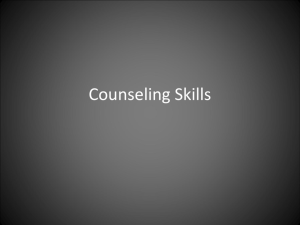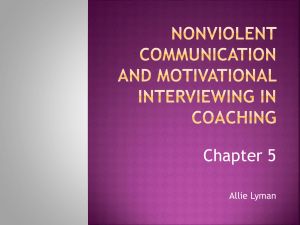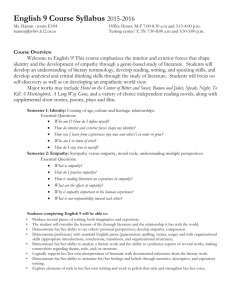The Chronicle Review Green Guilt
advertisement
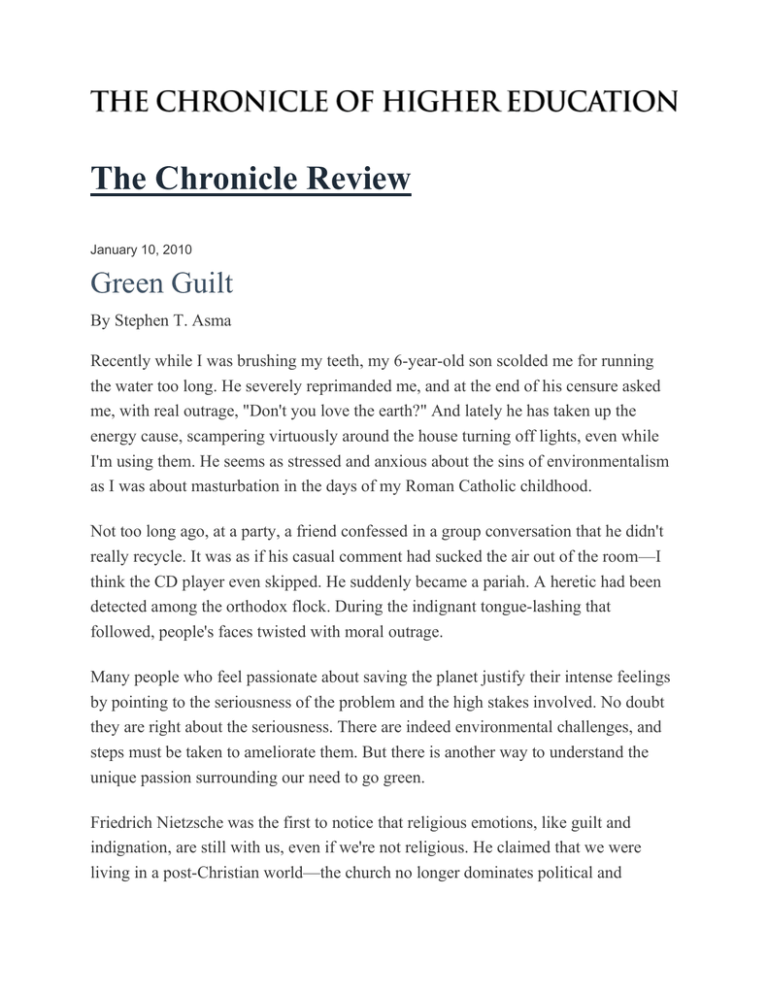
The Chronicle Review January 10, 2010 Green Guilt By Stephen T. Asma Recently while I was brushing my teeth, my 6-year-old son scolded me for running the water too long. He severely reprimanded me, and at the end of his censure asked me, with real outrage, "Don't you love the earth?" And lately he has taken up the energy cause, scampering virtuously around the house turning off lights, even while I'm using them. He seems as stressed and anxious about the sins of environmentalism as I was about masturbation in the days of my Roman Catholic childhood. Not too long ago, at a party, a friend confessed in a group conversation that he didn't really recycle. It was as if his casual comment had sucked the air out of the room—I think the CD player even skipped. He suddenly became a pariah. A heretic had been detected among the orthodox flock. During the indignant tongue-lashing that followed, people's faces twisted with moral outrage. Many people who feel passionate about saving the planet justify their intense feelings by pointing to the seriousness of the problem and the high stakes involved. No doubt they are right about the seriousness. There are indeed environmental challenges, and steps must be taken to ameliorate them. But there is another way to understand the unique passion surrounding our need to go green. Friedrich Nietzsche was the first to notice that religious emotions, like guilt and indignation, are still with us, even if we're not religious. He claimed that we were living in a post-Christian world—the church no longer dominates political and economic life—but we, as a culture, are still dominated by Judeo-Christian values. And those values are not obvious—they are not the Ten Commandments or any particular doctrine, but a general moral outlook. You can see our veiled value system better if you contrast it with the one that preceded Christianity. For the pagans, honor and pride were valued, but for the Christians it is meekness and humility; for the pagans it was public shame, for Christians, private guilt; for pagans there was a celebration of hierarchy, with superior and inferior people, but for Christians there is egalitarianism; and for pagans there was more emphasis on justice, while for Christians there is emphasis on mercy (turning the other cheek). Underneath all these values, according to Nietzsche, is a kind of psychology—one dominated by resentment and guilt. Every culture feels the call of conscience—the voice of internal self-criticism. But Western Christian culture, according to Nietzsche and then Freud, has conscience on steroids, so to speak. Our sense of guilt is comparatively extreme, and, with our culture of original sin and fallen status, we feel guilty about our very existence. In the belly of Western culture is the feeling that we're not worthy. Why is this feeling there? All this internalized self-loathing is the cost we pay for being civilized. In a very wellorganized society that protects the interests of many, we have to refrain daily from our natural instincts. We have to repress our own selfish, aggressive urges all the time, and we are so accustomed to it as adults that we don't always notice it. But if I was in the habit of acting on my impulses, I would regularly kill people in front of me at coffee shops who order elaborate whipped-cream mocha concoctions. In fact, I wouldn't bother to line up in a queue, but would just storm the counter (as I regularly witnessed people doing when I lived in China) and muscle people out of my way. But there is a small wrestling match that happens inside my psyche that keeps me from such natural aggression. And that's just morning coffee—think about how many times you'd like to strangle somebody on public transportation. When aggression can't go out, then it has to go inward. So we engage in a kind of selfdenial, or self-cruelty. Ultimately this self-cruelty is necessary and good for society— I cannot unleash my murderous tendencies on the whipped-cream-mocha-half-decaf latte drinkers. But my aggression doesn't disappear, it just gets beat down by my own discipline. Subsequently, I feel bad about myself, and I'm supposed to. Magnify all those internal daily struggles by a hundred and you begin to see why Nietzsche thought we were always feeling a little guilty. But historically speaking we didn't really understand this complex psychology—it was, and still is, invisible to us. We just felt bad about ourselves, and slowly developed a theology that made sense out of it. God is perfect and pristine and pure, and we are sinful, unworthy maggots who defile the creation by our very presence. According to Nietzsche, we have historically needed an ideal God because we've needed to be cruel to ourselves, we've needed to feel guilty. And we've needed to feel guilty because we have instincts that cannot be discharged externally—we have to bottle them up. Feeling unworthy is still a large part of Western religious culture, but many people, especially in multicultural urban centers, are less religious. There are still those who believe that God is watching them and judging them, so their feelings of guilt and moral indignation are couched in the traditional theological furniture. But increasing numbers, in the middle and upper classes, identify themselves as being secular or perhaps "spiritual" rather than religious. Now the secular world still has to make sense out of its own invisible, psychological drama—in particular, its feelings of guilt and indignation. Environmentalism, as a substitute for religion, has come to the rescue. Nietzsche's argument about an ideal God and guilt can be replicated in a new form: We need a belief in a pristine environment because we need to be cruel to ourselves as inferior beings, and we need that because we have these aggressive instincts that cannot be let out. Instead of religious sins plaguing our conscience, we now have the transgressions of leaving the water running, leaving the lights on, failing to recycle, and using plastic grocery bags instead of paper. In addition, the righteous pleasures of being more orthodox than your neighbor (in this case being more green) can still be had—the new heresies include failure to compost, or refusal to go organic. Vitriol that used to be reserved for Satan can now be discharged against evil corporate chief executives and drivers of gas-guzzling vehicles. Apocalyptic fear-mongering previously took the shape of repent or burn in hell, but now it is recycle or burn in the ozone hole. In fact, it is interesting the way environmentalism takes on the apocalyptic aspects of the traditional religious narrative. The idea that the end is nigh is quite central to traditional Christianity—it is a jolting wake-up call to get on the righteous path. And we find many environmentalists in a similarly earnest panic about climate change and global warming. There are also high priests of the new religion, with Al Gore ("the Goracle") playing an especially prophetic role. We even find parallels in environmentalism of the most extreme, self-flagellating forms of religious guilt. Nietzsche claims that religion has fostered guilt to such neurotic levels that some people feel culpable and apologetic about their very existence. Compare this with extreme conservationists who want to sacrifice themselves for trees and whales. And teachers, like myself, will attest to significant numbers of their students who feel that their cats or whatever are equal to human beings. And not only are members of the next generation egalitarian about all life, but they often feel positively awful about the way that their species has corrupted and defiled the whole beautiful symphony of nature. The planet, they feel, would be better off without us. We are not worthy. In this extreme form, one does not seek to reduce one's carbon footprint so much as eliminate one's very being. Pointing out these parallels is not meant to diminish the environmental cause. We should indeed do the things in our power, and within reason, to sustain the planet. But we have a tendency to become neurotic and overly anxious, especially when we are regularly told, via green marketing ploys, that each one of us is responsible for the survival of the planet. That's a heavy guilt trip. The same demographic group for whom religion has little or no hold (namely white liberals) turns out to be the most virulent champions of all things green. Is it possible that these folks must vent their moral spleen on environmentalism because they don't have all the theological campaigns (e.g., opposing gay marriage, opposing abortion, etc.) on which social conservatives exercise their indignation? If environmentalism is a substitute for religion—a way of validating certain emotions—then we might expect to find other secular surrogates for guilt and indignation. Our tendencies to sin, repent, and generally indulge in self-cruelty can be seen cropping up in our obsessions about health and fitness, for example. Struggling with our weight (diet and relapse) has risen above the other deadly sins to take a dominant position in our secular self-persecution. And our resentful aggression still manages to find some occasional pathways to the external world. We may not be able to punch the people we want to punch in real life, but we can turn some of our aggression outward at the reprobates of TV land. What a joyful hatred we all felt at the Octomom or Britney. It was a thoroughly cleansing bit of moral outrage. Or consider the inflamed moral drama for viewers of the Jon & Kate Plus Eight debacle. And more of this kind of indignation, previously reserved for religious condemnation, can be seen and heard everywhere on the screens and airwaves of the 24-hour "news" cycle. Large segments of the news seem calculated to facilitate the catharsis of our built-up resentment. Daytime talk shows and reality shows seem similarly designed to elicit our righteous anger. They form the other side of the religious coin—in addition to the self-cruelty of guilt, we can vent our aggression outwardly (like a crowd at a witch drowning) as long as it's justified by piety and the defense of virtue and orthodoxy. Environmentalism is a much better hang-up than worrying about the spiritual pitfalls of too much masturbation. Even if it's neurotic, it's still doing some good. But environmentalism, like every other ism, has the potential for dogmatic zeal and obsession. Do we really need one more humorless religion? Let us save the planet, by all means. But let's also admit to ourselves that we have a natural propensity toward guilt and indignation, and let that fact temper our fervor to more reasonable levels. Stephen T. Asma is a professor of philosophy at Columbia College Chicago. His books include On Monsters: An Unnatural History of Our Worst Fears (Oxford University Press, 2009) and Why I Am a Buddhist (Hampton Roads Publishing Company, 2010). The empathy deficit Even as they become more connected, young people are caring less about others By Keith O’Brien October 17, 2010 Young Americans today live in a world of endless connections and up-to-the-minute information on one another, constantly updating friends, loved ones, and total strangers — “Quiz tomorrow...gotta study!” — about the minutiae of their young, wired lives. And there are signs that Generation Wi-Fi is also interested in connecting with people, like, face-toface, in person. The percentage of high school seniors who volunteer has been rising for two decades. But new research suggests that behind all this communication and connectedness, something is missing. The study, conducted by researchers at the University of Michigan Institute for Social Research, found that college students today are 40 percent less empathetic than they were in 1979, with the steepest decline coming in the last 10 years. According to the findings, today’s students are generally less likely to describe themselves as “soft-hearted” or to have “tender, concerned feelings” for others. They are more likely, meanwhile, to admit that “other people’s misfortunes” usually don’t disturb them. In other words, they might be constantly aware of their friends’ whereabouts, but all that connectedness doesn’t seem to be translating to genuine concern for the world and one another. “To me, that’s the basic glue,” said Sara Konrath, a research assistant professor and the lead author of the study on empathy. “It’s so rewarding to connect with human beings. It’s so good for our bodies to do this. Everything we know as psychologists tells us it’s the most wonderful thing. So if we’re losing that, I think that is distressing.” Empathy might seem like a hard-to-define, touchy-feely idea, and it’s fair to say that most of us don’t spend our days wondering if we’re empathetic. Yet psychologists have been trying to measure empathy for decades, recognizing its inherent value to humanity. A world without empathy, they say, is a world we wouldn’t want to live in. “Do a thought experiment,” said Mark Davis, a professor of psychology at Eckerd College in Florida who’s spent the last 30 years studying empathy. “Imagine if humans didn’t have the capacity for empathy. What would it mean if, in fact, we never gave a damn about what happened to other people? That’s an almost an inconceivable world.” It’s so inconceivable that Davis counts himself among the skeptics of the new research that documents the decline. “Put me down,” he said, “as intrigued by it.” He points out that Konrath, along with coauthors Edward O’Brien and Courtney Hsing, are drawing their conclusions from a relatively small sample size — just 72 studies over three decades. He and others would like to see more work on the matter before making any final conclusions about how much young people care, or don’t care, about others. But even some skeptics agree that it’s disturbing to consider the trend laid out in the new research and then play out the string. “As awful a species as we can be — and we certainly have the capacity for terrible things — we’re also capable of some pretty wonderful things, noble things, self-sacrifice,” said Davis. “And the fear would be, if there really is a genuine decline in our ability to act on this capacity we have, the world becomes meaner.” Empathy is such a basic ingredient of the human experience that even babies exhibit it, crying when other children cry or reacting to the facial expressions of adults and parents. Yet the word itself is relatively new: It didn’t enter the English lexicon until the early 1900s, derived from the German word einfühlung, according to Daniel Batson, a researcher of empathy and professor emeritus at Kansas University. And psychologists studying empathy still disagree on some basic questions about how it should be defined: Is it feeling for others? Feeling as others feel? Understanding how others feel? Or some combination of the above? “It’s all over the place,” Batson said. “There’s no agreed-upon definition.” But at the most basic level, most concur that empathy is some sort of emotional response to another person’s plight, pain, state, or suffering. “It’s not just putting oneself in another’s shoes,” said Aaron L. Pincus, a professor of psychology at Penn State University. “It’s truly grasping what they’re experiencing....Your emotional state will move in a direction more similar to the person you’re empathizing with.” In small ways, psychologists say, empathy is constantly driving our daily lives, as we take into consideration how other people might feel before we act. Some suggest that empathy is the foundation for social norms, even basic etiquette. We typically don’t insult people to their faces, Davis explained, in part because we know they’re not going to like how that feels. Given its obvious importance to relationships and the human experience, psychologists began studying the issue in the early to mid-20th century. Some researchers have conducted live experiments, staging scenes where someone is suffering and then gauging how observers respond to watching the pain. Others, meanwhile, have developed surveys where people are asked to self-report how they feel, or don’t feel, about others or themselves in certain situations. The survey respondents usually then receive a score, essentially assigning a number to describe just how empathetic they are or aren’t. Such studies have obvious flaws. Some people, when surveyed, want to give answers that reflect positively on them. However, researchers have found that these scales are actually effective at predicting how people will behave. Spouses who score higher on empathic concern are more likely to offer emotional support to their partners. People capable of seeing another person’s perspective are more likely to help and less likely to exhibit aggression. And those who are narcissistic are probably going to be less empathetic. “Generally speaking,” said Pincus, “there’s a lack of empathy as narcissism increases.” That link between empathy and narcissism drove the Michigan study. In recent years, some psychologists, including Konrath, have offered evidence that narcissism may be on the rise, leading to a debate about whether that’s actually happening and, if so, whether it’s a problem. A certain amount of narcissism is healthy, psychologists point out, helping give people the confidence to compete, succeed, or lead others. But it can also tip the other way, creating a world of increased self-absorption. Konrath and her coauthors, hoping to get to the bottom of this debate, set out to measure how empathy had changed over time. If narcissism was truly on the rise, they postulated, then empathy had to be in decline. They began to analyze the results of 72 different surveys, given to almost 14,000 college students, beginning in 1979, charting how the students answered the same questions over time. Initially, they found little shift. “It’s looking sort of flat, or no real pattern, up until 2000,” Konrath said. “And then there’s this sudden, sharp drop.” Starting around a decade ago, scores in two key areas of empathy begin to tumble downward. According to the analysis, perspective-taking, often known as cognitive empathy — that is, the ability to think about how someone else might feel — is declining. But even more troubling, Konrath noted, is the drop-off the researchers have charted in empathic concern, often known as emotional empathy. This is the ability to exhibit an emotional response to someone’s else’s distress. Perhaps more than any other characteristic, one’s capacity for empathic concern dictates how much one cares about others. Those who score high in empathic concern, according to past research, are more likely to return incorrect change to a cashier, let someone else ahead of them in line, carry a stranger’s belongings, give money to a homeless person, volunteer, donate to a charity, look after a friend’s pet or plant, or even live on a vegetarian diet. And what’s alarming, Konrath said, is that empathic concern has fallen more than any other aspect of empathy. Between 1979 and 2009, according to the new research, empathic concern dropped 48 percent. The results have led to the obvious follow-up questions: What cultural changes may have shaped children in the 1980s and ’90s, giving rise to a less empathetic generation? Why do we care less? And is there any way we can reverse the trend? The answers, to date, are all speculative. What’s clear, Konrath said, is that something critical began happening about a decade ago when a new crop of college students began taking these standard surveys. These students, Konrath points out, would have been born in the 1980s, raised in the ’90s on video games, 24-hour cable television, and widespread divorce, and sent off to college with laptops and cellphones — the young pioneers of the digital age. Perhaps, some suggest, technology has connected them in one sense, but pushed them away from each other in another. “It’s very shallow, a lot of these connections,” said Jean Twenge, coauthor of “The Narcissism Epidemic: Living in the Age of Entitlement.” “You don’t really have an emotional connection with someone on Facebook.” Perhaps, others argue, the problem is the advent of 24-hour cable and Internet news; young people today have been inundated with news to the point that they cannot care anymore. The oil spill in Louisiana this week, the flood in Pakistan next week — the tragedies all run together, making it harder to care in any sort of sustained way. Parenting could also be at fault, Konrath speculated. Perhaps today’s less empathetic children were raised by more narcissistic parents. Or the problem could be a hypercompetitive world in which everyone is trying to get into the best schools, get ahead, get more. It’s possible, some psychologists argue, that people haven’t changed so much as the world around us has. Innately, they suggest, young people today still care as much as they once did. But at a time when jobs are scarce, the economy is sputtering, our politics are filled with anger, and people often feel powerless to address the problems in their own lives — much less affect big issues like climate change — perhaps young Americans are just evolving to focus on what matters most: their own tiny worlds. “I’d be extremely surprised if it turns out that students were now less capable of caring for other people — their friends, romantic partners, family, or pets,” Batson said. “The idea that they’re less capable of caring than they were 20 years ago — that just seems unlikely. I don’t think we change like that. But our situation may have changed. One may feel pressure to pull back on the scope of one’s concern. Pull it back and say, ‘I’ve got to deal with the needs that are pressing right here.’ ” Konrath also warns that it’s hard to know if the problem is as acute as the study shows. College students aren’t a representative slice of America. In order to know if empathy is truly declining, Konrath said, she would need to run a study that captures the full picture of the populace — research that her group has already started. And though the findings aren’t published yet, Konrath said, the early indications are that the national findings support what they have already found. “People who were born in the ’80s or later,” she said, “are lowest in empathy, regardless of whether they have a college degree or not.” Still, she is trying to stay upbeat about the present and the future. If empathy can go down, she said, it can also go up. It’s malleable. But still there’s reason for concern, just knowing how a lack of empathy can affect society. In recent years, W. Keith Campbell, Twenge’s coauthor and a professor of psychology at the University of Georgia, has run a series of experiments where he places four people in charge of forestry companies harvesting an imaginary 200-hectare forest. He gives them permission to cut down 10 hectares a year, stipulating that 10 percent will grow back. The question before the participants is: Will they limit their short-term gains for the long-term good of the group? Or will they cut down as many trees as possible, thereby exhausting the resource for everyone much faster? The narcissists — those focused primarily on themselves — always do well, Campbell said, harvesting more trees than the others in the group. But soon enough, the system is destroyed and everyone is worse off. “So if you have a society where a lot of people are narcissistic, the whole thing blows up,” he said. “It implodes.” Freelance writer Keith O’Brien, winner of the Casey Medal for Meritorious Journalism, is a former staff writer for the Globe. E-mail him atkeith@keithob.com. © Copyright 2010 Globe Newspaper Company.
